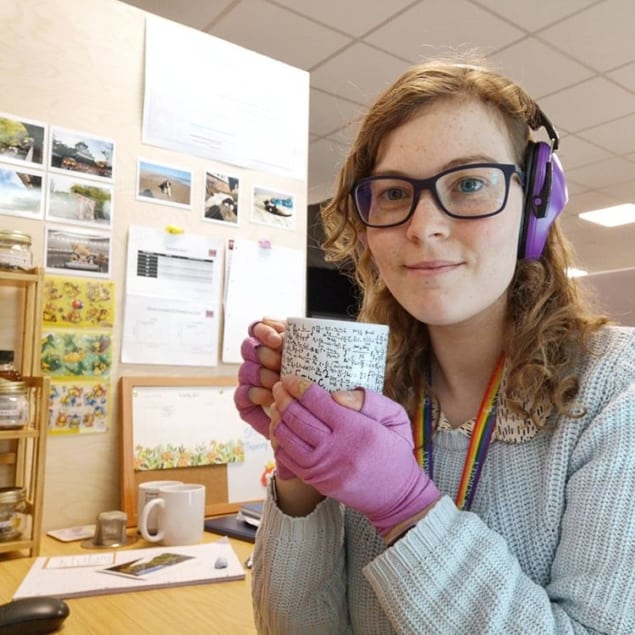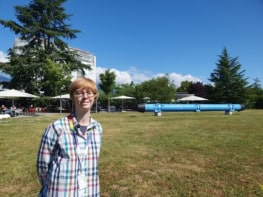Daisy Shearer is a PhD student in experimental physics at the University of Surrey, UK, where she studies semiconductor spintronics in InSb-based materials for quantum technology applications.
This post is part of a series on how the COVID-19 pandemic is affecting the personal and professional lives of physicists around the world. If you’d like to share your own perspective, please contact us at pwld@ioppublishing.org.

In March, everyone in our research institute was advised to work from home if possible, and our labs shut down soon after. Although my PhD project is mostly experimental, I am lucky in that I had already started incorporating some computational modelling into my work. The reason I did this is because, as an autistic person, I am not always able to physically go to campus: I sometimes find the myriad of sensations there overwhelming, and social interactions can leave me fatigued. So, I was already searching for ways to make meaningful progress on my research while working remotely for longer periods.
Despite this preparation, though, I have struggled. Big changes and unpredictable circumstances can be incredibly difficult for autistic people like me, and although there is a wide diversity of autistic experiences – we all have our own challenges and strengths – I think most of us have felt the impact of the pandemic to a heightened degree. The current global situation has also taken a huge toll on my already poor mental health. I’ve found that I can only take things a day at a time right now. Otherwise, things feel way too overwhelming and I get paralysed by anxiety. Like many others, I have had to temporarily withdraw from work over the last few months to look after myself. It is a very difficult time for us all and I think it’s important to acknowledge this.
Regaining control
I ended up moving back in with my parents due to a variety of factors. In the end this was for the best as I was no longer able to live independently, but it does mean that I am living in a very different and less controllable sensory environment. Because of this, I experienced a huge increase in autistic shutdowns (an internal response to sensory overwhelm, during which I may become unresponsive, non-verbal, vacant and floppy) and meltdowns (an external response where I may lose behavioural control and engage with behaviours such as yelling, crying, lashing out or hitting myself). I’ve also had my fair share of panic attacks.
Luckily, I’m now recovering, and I should be able to return to my rented house near my lab soon. This is great news, as I will then be in a much more controllable environment, reducing my sensory overwhelm and enabling me to work on my research more consistently (now that I am no longer withdrawn from my PhD programme). It will also mean that I can walk to the lab once we have implemented social-distancing protocols and I have booked a session to carry out new experiments there.
Returning to the lab will be hugely beneficial for me. The lab is usually my “safe space”, a place where I feel inspired, and my inability to do experimental work has led to feelings of stagnancy and uselessness. I miss the thrill of fabricating a beautiful nanostructure, collecting new data from a device, learning a new technique from a colleague, and that wonderful moment when you finally finish troubleshooting your experiment. It’s not quite the same when you’re debugging code or proofreading your writing!
Accessibility and inclusion
Although the pandemic has had a huge negative impact on everyone’s lives, I do see some positives that could come out of it, particularly in relation to accessibility and disability inclusion. Many assistive technologies and “reasonable adjustments” have now become useful for everybody. In some ways, I think able-bodied individuals have been forced to learn from people with disabilities, since we have always had to adapt and be flexible in order to work in environments that are largely inaccessible to us. There is some truth in the idea that the pandemic supports the social model of disability, which holds that attitudes and structures in society are what make people “disabled”, rather than their medical conditions, and that appropriate adjustments and accessibility aids can help overcome this.

Here’s an example. Before the pandemic, I regularly worked from home on Fridays, and I often found that my productivity increased considerably when I did. This is probably because home working eliminates the sensory stresses of travelling to campus, while also giving me one day a week when I don’t have to socialize in person. Working from home also enables me to be non-verbal for a day, which helps me process experiences and information. Finally, when I am at home, I am much more likely to tap into an aspect of autism (and other neurodivergent conditions) that is, I think, a great asset: hyperfocus. When I’m in a hyperfocused state, my brain can concentrate intently on a task for a long period of time, but I’ve never been able to enter hyperfocus in an office (particularly an open office).
As well as facilitating home working, the pandemic has also given me the chance to experiment with different ways of communicating. Because I experience some delays in my auditory processing when I’m under stress, in-person one-to-one meetings are incredibly difficult for me. I get nothing out of them apart from very high anxiety levels and a probable sensory overload. The same is true of phone or video calls. Even before the pandemic struck, I was trying to find solutions to this, such as communicating more through e-mail. Now, I have the option of meeting with my supervisor using instant messaging and screen sharing, which has led to several incredibly engaging and useful discussions.
Hopes for a new normal
Of course, I appreciate that my supervisor prefers in-person meetings, and I will endeavour to have them again once things are back to normal. But the thought that we will still be able to meet through instant messaging even if I am unable to go onto campus for some reason is amazing. The fact is that some people, particularly those of us who are neurodivergent, communicate differently, so it makes sense that we should have different options for sharing our ideas and learning from others’ perspectives.

Physics in the pandemic: ‘There are discussions about how we might automate some of our day-to-day tasks’
I also hope that the pandemic will make it easier for disabled people to work from home, without having to go through the degrading process of “evidencing” our conditions and proving that such adjustments are “reasonable”. This kind of self-advocacy can be incredibly draining. It takes a lot of time to access the support and adjustments you need to work to the best of your abilities — and that’s without taking into account the challenges faced by undiagnosed people, who often don’t have adequate “evidence” of their disability. The high cost and time required for a diagnostic assessment mean that many people just don’t get assessed and are thus denied the support and adjustments they need. Now that we’ve proved that, for example, it’s possible to carry out one-to-one meetings remotely, there isn’t any excuse to deny anyone that reasonable adjustment in the future.
In summary, I hope that there will be a shift towards accommodating individual needs in the workplace – particularly for disabled people, but also for anyone who finds that they work better in a certain place or in a certain way. There’s no reason why we shouldn’t try to maximize everyone’s wellbeing and ability to work to the best of their capabilities.



